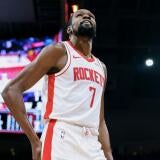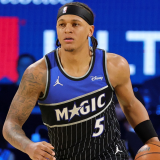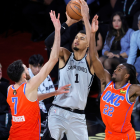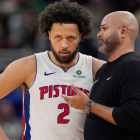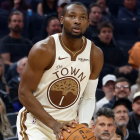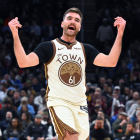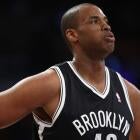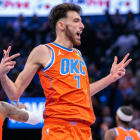NBA Quarter Century awards: LeBron James wins MVP and two other honors, surprising pick for top defender
We're handing out the major NBA awards for the first 25 years of 21st-century basketball
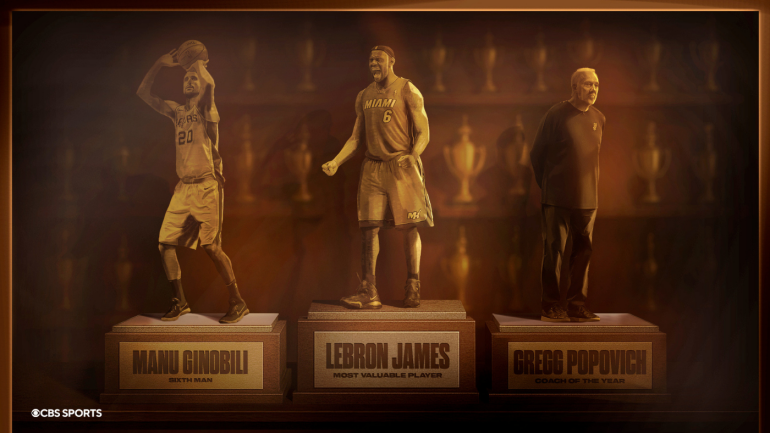
We don't like to admit this, but NBA awards are handed out based off of relatively small samples. Sure, 82 games sound like a lot, but all it takes, especially in the 65-game minimum era, is a sprained ankle or tweaked hamstring to change a vote. Sometimes a player's supporting cast robs him of a trophy. Sometimes a narrative takes hold and overrides common sense. Sometimes a player happens to peak at a weak point in league history. Weird things can happen across six months.
But 25 years? That's a more reliable sample. We've now made it through one quarter of the 21st century, so let's hand out some awards based on everything we've seen since Jan. 1, 2000. These awards were voted on by the CBS Sports NBA staff and will cover every major NBA award with one exception. There was simply no clean way to handle Most Improved Player. Therefore, we decided to cut it.
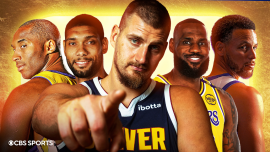
Everything else is fair game, and voters were not limited to regular-season accolades. Playoff performance is fair game as well. So with that in mind, let's hand out some hardware for the best performances of the century.
Most Valuable Player
- LeBron James
- Stephen Curry
- Tim Duncan
LeBron James leads the 21st century in points and MVP awards. He's second in assists, third in triple-doubles, fourth in rebounds and has four championships to his name. Practically anyone could have guessed he would be considered the most valuable player of the century. When you're arguably the best player that has ever touched a basketball and your competition all retired before you debuted, yeah, you're a pretty safe bet for an honor like this.
The down-ballot voting was where things theoretically should have gotten a bit more compelling, except our voters had a consensus: Stephen Curry at No. 2, Tim Duncan at No. 3. They were both worthy choices. Only three players this century have won multiple championships and multiple MVP awards, and you're looking at them here. Duncan won MVP in 2002 and 2003 and four championships even if you exclude his 1999 title. Curry won MVPs in 2015 and 2016 along with four titles spread between 2015 and 2022.
As a bit of scrolling will show you, our voters picked Duncan as the defensive player of the century. Had we voted on an offensive player of the century, the pick may well have been Curry. He was at the forefront of the 3-point revolution, and even now, as he nears the end of his legendary career, he's never been replicated. It shouldn't be possible to average nearly 25 points per game for a career and still be just as valuable when the ball isn't in your hands, but Curry has done that. Individual offense tends to be harder to come by than individual defense, so it shouldn't be too surprising that Curry had the edge over Duncan.
What is surprising? The unanimity of the voting body. All seven ballots picked the same three players in the same order. Kobe Bryant, Shaquille O'Neal, Kevin Durant and Nikola Jokić were all absent from the ballots. While none of them have much of a leg to stand on against LeBron, there is hardly such a consensus on those players against Curry and Duncan in the wider basketball community. Maybe we're spending too much time together.
Defensive Player of the Century
- Tim Duncan
- Draymond Green
- Kevin Garnett
Our voting process for Defensive Player of the Year showed just how flawed this award actually is. There were four players who won multiple Defensive Player of the Year trophies this century: Ben Wallace, Dwight Howard, Kawhi Leonard and Rudy Gobert. Dikembe Mutombo and Alonzo Mourning both won multiple awards, including at least one this century. None of them finished in the top three. Instead, our winner, Tim Duncan, never actually won the award in reality. Draymond Green and Kevin Garnett won it once apiece.
So what's happening here? Well, it's absolutely possible that voters just get this award wrong pretty frequently. Defense is the hardest trait to measure, especially in context. Is a center a great rim-protector because his team doesn't allow points at the rim? Or do the guards in front of him prevent opposing ball-handlers from ever getting there in the first place? We don't have reliable defensive numbers. That very often leads to voters overemphasizing team defensive performance and the few counting stats we do have (most often, blocks) to make simple decisions when the real answers are usually more nuanced.
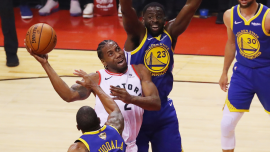
And then there's the fact that these awards, in reality, cover only the regular season. Duncan and Green made their names in the postseason. Garnett didn't have the supporting cast to do that for most of his career, but thrived when that changed in Boston. Wallace in particularly was a similar dominant playoff defender, but he was also part of an extremely highly-regarded defensive ensemble. Leonard was perhaps the best wing defender in NBA history, but it's difficult for perimeter players to affect opposing offenses as much as a big man can. Gobert has a number of high-profile playoff disappointments. Howard's playoff track record was mostly positive, but he won his trophies at a very weak point in the history of the center position.
The race between Duncan, Green and Garnett was the one of the closest of any we measured. Duncan squeaked ahead as the anchor of a defense-first dynasty. Green edged out Garnett by a single voting point as perhaps the definitive defender of the post-3-point boom era. It's an unfair outcome for Garnett. Had he been drafted by a team like the Spurs, perhaps he could have done what Duncan did. Had he been drafted 20 years later as Green was, he too could have defined a generational shift. You're splitting hairs between the three of them, and Garnett, given his combination of size, athletic traits and basketball IQ, was probably the best skill set mix of the trio. But, as is so often the case with the actual award, external circumstances likely swung the voting away from him.
Rookie of the Century
- LeBron James
- Victor Wembanyama
- Luka Dončić
This vote -- based on who had the best overall rookie season -- was the closest of any award we picked. James beat Wembanyama by two voting points, with Dončić and Blake Griffin also factoring into the equation as well. Among those four players, rookie James actually only led a single major statistical category with 1.6 steals per game. Griffin was the counting stats winner, leading in points, rebounds and field goal percentage while playing all 82 games and making the All-Star Game. Wembanyama lapped the group in most advanced metrics and earned All-Defense honors.
But James had a few factors working in his favor. The first was balance. He and future teammate Dončić were remarkably well-rounded rookies, averaging at least 20 points, five rebounds and five assists. Dončić's counting stats were slightly more impressive in a vacuum, but James debuted during the end of the dead ball era. Remember, during his rookie year, hand-checking was still legal. Despite that, he also spearheaded the most impressive team improvement. He took a 17-win Cavaliers team all the way up 35 victories as a rookie despite no other meaningful roster changes. Griffin helped the Clippers win only three more games in 2011, Dončić added nine wins for the 2019 Mavericks, and the Spurs posted identical records with and without Wembanyama.
I would be remiss if I didn't point the single biggest snub of this entire project. Chris Paul didn't receive a single Rookie of the Century vote despite leading all 21st century rookies in VORP and Win Shares and tying Wembanyama for the Box Plus-Minus lead. He did that despite playing for a team that had been displaced by Hurricane Katrina. Paul is a sorely under-appreciated legend, and it started all the way back in his rookie season.
Coach of the Century
- Gregg Popovich
- Phil Jackson
- Erik Spoelstra
Interestingly, Popovich won Coach of the Century unanimously despite Jackson technically have one more 21st century championship than he does. Of course, Popovich wasn't working with quite as much star power, and he also lasted quite a bit longer, only just retiring this offseason compared to Jackson, who coached his final game in 2011. There's also been of a critical re-evaluation of some elements of Jackson's coaching as time has passed. Most notably, the triangle offense has all but disappeared from the NBA. While most teams incorporate elements of it, pretty much every attempt to truly run the triangle has gone badly, suggesting to some that its success was based mostly on the star players Jackson ran it with. Popovich's principles, especially the internationally inspired motion offense he designed later in Duncan's career, have remained in vogue, and his track record of developing talent remains practically perfect.
Jackson faced stiff competition for the second-place spot. Steve Kerr, Erik Spoelstra and Rick Carlisle all received votes. Once again the coach with more championships lost out in the voting. Kerr has four, but lost to two-time champion Spoelstra. The difference between the two is that Spoelstra has succeeded with multiple rosters, whereas Kerr has always had Curry as his core player. Carlisle finished in fifth place, but has had less star power than anyone ahead of him. Had Tyrese Haliburton stayed healthy, he may have become the first coach this century to win a championship as a No. 4 seed.
Sadly missing the cut was Mike D'Antoni. The greatest offensive innovator of the 21st century never won a championship, so despite a stellar record and his essential components to modern basketball, he didn't garner a single vote.
Sixth Man of the Century
- Manu Ginobili
- Andre Iguodala
- Lou Williams
Sixth Man of the Year often functions like Defensive Player of the Year. At least this century, it's become a somewhat dynastic award. Lou Williams and Jamal Crawford have won it three times apiece. But Williams finished third on balloting. Crawford didn't make the final cut. Voters tend to look for the highest-scoring bench player when picking Sixth Man of the Year winners because the standard idea of a sixth man is typically a microwave scorer.
But our top two finishers were more well-rounded players. Ginobili was obviously a prolific scorer, but he was a Hall of Famer because of his all-around game. He was also a stellar playmaker and capable defender. He might have driven Popovich crazy at times because of his risk-tolerance, but he was also San Antonio's secret weapon. You always knew Popovich was ready to take a series seriously when he finally decided to start Ginobili.
Iguodala had practically nothing in common with the standard sixth man, and he unsurprisingly never won a Sixth Man of the Year award. Yet he won Finals MVP in a series in which he started only half of the games. His willingness to come off of the bench as a former All-Star set the "strength in numbers" tone Steve Kerr needed to kickstart his juggernaut in Golden State. He was one of the best defenders of his era, a brilliant secondary playmaker, and when he needed to be, a clutch shotmaker. He'd never beat Williams or Crawford one-on-one, but there's no question whatsoever which of them impacted winning the most.
Executive of the Century
- RC Buford
- Sam Presti
- Pat Riley
Here's a fascinating tidbit: our No. 1 and No. 2 finishers are both here in part because of a single move. The Spurs nabbed two of their three dynastic pillars, Tim Duncan and Manu Ginobili, in the 20th century. The third, Tony Parker, was drafted in 2002. He would go on to be essential the four championships RC Buford would win as a general manager. Yet a staffer far lower on the totem poll, Sam Presti, has been widely credited with the Parker selection. Six years later, he would take over the Seattle Supersonics and eventually build a burgeoning dynasty in Oklahoma City.
He may one day win as much as Buford has in San Antonio, but for now, he still has several titles to go. Even after the Parker pick, Buford stewarded the Duncan dynasty brilliantly. His 2011 draft night trade for Kawhi Leonard reinvigorated a roster that had grown stale, and while he has now been promoted to team president, he still has an active role in the front office building around Victor Wembanyama. Of course, neither Buford nor Presti ever held final decision-making power in San Antonio. That power has always been held by Gregg Popovich. Yet it is a testament to the culture he built that two of his deputies could be this highly regarded.
Pat Riley was a relatively distant third in the voting, and that's somewhat surprising given the sheer magnitude of star acquisitions he's made this century. He drafted Dwyane Wade, Bam Adebayo and Tyler Herro. He traded for Shaquille O'Neal and Jimmy Butler. And, of course, he recruited LeBron James and Chris Bosh in free agency in a single offseason. The big names will always be Riley's legacy, but his front office has always identified under-the-radar players better than pretty much anyone else. At points in their 2023 Finals run they were starting three undrafted free agents: Gabe Vincent, Max Strus and Caleb Martin. Udonis Haslem is the rare undrafted free agent with his number retired. Rounding out the voting were Danny Ainge, winner of the 2008 title and the man who set up Boston's 2024 championship, and Bob Myers, the general manager for Golden State's dynasty.
Clutch Player of the Century
1. LeBron James
T2. Dirk Nowitzki
T2. Kobe Bryant
LeBron James has scored almost 8,300 playoff points in his career. No other player this century has reached 5,000. He has four game-winning buzzer beaters in the postseason and what is arguably the greatest clutch defensive play in NBA history when he chased down Andre Iguodala in Game 7 of the 2016 Finals. He was the ultimate no-brainer pick for Clutch Player of the Century.
After that? It was a mess. Seven different players received votes: Dirk Nowitzki, Kobe Bryant, Damian Lillard, Stephen Curry, Nikola Jokić and Klay Thompson. Every single one of them has holes in their résumé.
Nowitzki lost in the first round as a No. 1 seed. Bryant's end-of-game stats are notoriously poor despite his reputation, and his Finals stats are somewhat overrated as well. Lillard has never made the Finals. It took Curry four tries to win a Finals MVP. Jokić's defensive vulnerabilities can be problematic late in games. Thompson has never been a primary ball-handler. And remember, these are the most clutch players we could think of. All of them have serious drawbacks. Heck, James does too. The 2011 Finals are a permanent stain on his resume. His late-game shooting numbers as a Laker are poor. The overriding message here should be that there might not be such a thing as a consistently clutch player. There may perhaps be consistently un-clutch players. But most of the time, an especially clutch player is usually just a great player maintaining his standard greatness a bit more often than his contemporaries.
In the end, Bryant and Nowitzki tied for second place. Among the others to receive votes, only Curry can claim to have played in and won as many big games as they did. Lillard has his two series-ending walkoff shots, but little else. Jokić is still building his clutch résumé, though he'll surely factor into any future lists like this. Game 6 Klay is a menace. Not every big game is a Game 6. If you need a bucket to win a big game, you're going to feel pretty confident with the ball in either Bryant's or Nowitzki's hands.


